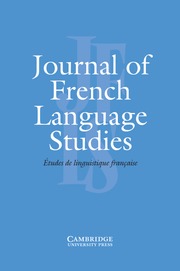No CrossRef data available.
Article contents
Primarily transitive verbs without Objects in Modern French*
Published online by Cambridge University Press: 10 October 2008
Extract
In modern French primarily transitive verbs without objects, such as the one in bold in (1), are a common phenomenon:
(1) Je pensais qu'il allait me libérer, mais j'ai vu tout de suite, à sa tête. (van Cauwelaert, 1994: 40)
Here it is understood that there is an object of the action expressed by the verb voir – ‘that he was not going to let me free’ – but there is no grammatical reflex of that object. The purpose of this article is to discuss a number of such cases. On the basis of examples drawn from newspapers, magazines and novels it will be suggested that, while in many instances the valency of these verbs has not changed, in others it has.
- Type
- Articles
- Information
- Copyright
- Copyright © Cambridge University Press 1999


